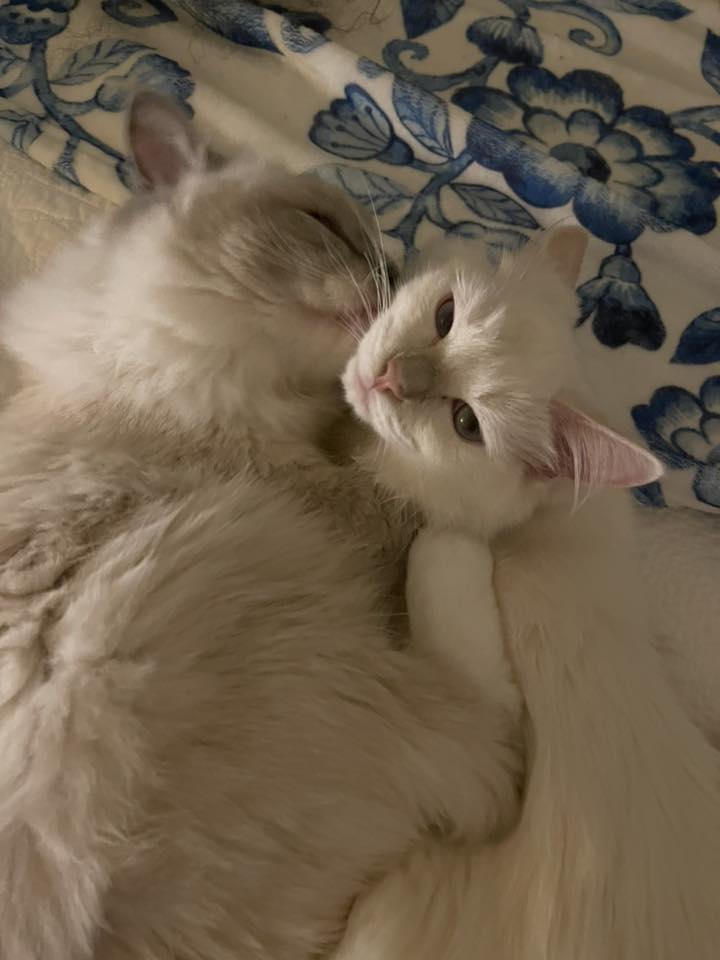
I’ve been reading posts from folks who are in the process of introducing new feline family members to the established cats already in their households. Some of the pairings seem to be working out from the start, others don’t look as if they’re ever going to flourish into friendship. I asked friends online for their thoughts.
I said, “Can cats be friends … with each other? How does that happen or … how can it go wrong? Can it be easy or difficult? Tell us about your cats—cats you have now or cats you’ve had in the past. What are your experiences with and your thoughts about the cat friendships you’ve observed?”
Here are some of their comments.
Amy Suggars (Ohio) My cats are best friends. They play together, eat together, sleep together.

Photo by Amy Suggars
Lisa Lenke Sousa (Washington) It depends on the individual cat. Some cats get along excellently with other cats. I have seen that a couple of them are inseparable. Others, like my Marshmallow, not so much. She wants to be the only cat in the family.
Bogs McFleegle (British Columbia) Current cat, eight years old approximately, neutered, rescued at one year old from strayhood, was an absolute bastard to other felines in his younger days. As he’s aged, he is less combative but still unaccepting of any feline incursion into his turf.
Timothy Page (Oregon) The only cats I had as friends were cats that grew up together. My X has a lot of cats, so I think they are all kind of forced to be friends or at least tolerate each other.
Tom Quinn (Washington) Of all the cats I’ve lived with, only two have ever been close. Dido and Cleo are sisters from the same litter. They sometimes snap at each other and have little tiffs, but they also sleep with their bodies touching. All my other cats have kept a distance from each other, like they had a restraining order. Seven have been female. They slept apart on the bed, but they were willing to share it. But the only tomcat in the house, Enzo, was not welcome there. He had to sleep in the living room. He never did get close to the females, who just couldn’t accept him.

Photo by Elizabeth Bernice Scott
We Love Catz | by Lilla Hangai
“Humans are extremely social beings, and despite dangers, friends and family ties generally hold us together. Cats, however, form their social networks for survival and easier access to resources.
“House cats are generally more social than their wild and feral counterparts. They seek connections more often and trust those around them more. Moreover, in the home environment, there is never a shortage of food, so they don’t have to fight for it.
“But not every cat will accept another cat on its territory because they are strongly territorial animals. While they share many similarities with us, we can definitely say that they don’t make friends in the same way. So, introducing two cats in a household always requires careful preparation and a lot of patience.”
Catster.com
Do Cats Make Friends With Other Cats? Feline Social Behavior Explained
by Brooke Billingsley
If you’re currently living in a one-cat household, you may have caught yourself wondering if your cat might be happier if you gave them a feline friend. If your cat spends a lot of time alone or seems excessively bored, even when you spend daily time with them playing and snuggling, then they may benefit from the addition of another cat in the home.
It’s important to remember, though, that most cats are perfectly content to live in a home with no other cats. In the wild, their territory would be relatively large, and cats are often not keen on sharing their territory with other felines. This is one of the main reasons that it’s so difficult to introduce two cats to each other.
Many cats can adjust to the addition of a new cat to the home. Even if your cat may not necessarily want a feline friend, it doesn’t mean that they won’t be able to adjust to a new cat, nor does it mean that they’ll never bond with the new addition. If your cats would have trouble getting used to each other, you can reach out to a veterinarian and ask about the best way to introduce them properly and safely.
Paws.org | Introducing Your Cat to a New Cat | Copyright ASPCA
“If you’re bringing a new cat into your home, be patient. The introduction must be gradual. Following the initial introduction, it can take a very long time for a relationship to grow. It takes most cats eight to 12 months to develop a friendship with a new cat. Although some cats certainly become close friends, others never do. Many cats who don’t become buddies learn to avoid each other, but some cats fight when introduced and continue to do so until one of the cats must be re-homed.
“If your resident cat becomes aggressive when she sees other cats outside your home, you’ll probably have a difficult time introducing a new cat into your household. If your cat has lived harmoniously with other cats in the past, the odds are good that she’ll adjust to a newcomer. However, it’s impossible to predict whether or not any two individual cats will get along.
“Unfortunately, there are no reliable guides for deciding the best matches among cats. Some cats are very social and enjoy living with other cats, while others prefer solitary lives. The individual personalities of the cats are more important than any other factor, such as sex, age or size. Be aware that the more cats you have, the higher the likelihood that there will be conflicts among them.”
Catster.com
How To Tell If Your Cats Are Getting Along: Body Language & Socialization Tips
by Ashley Bates
There can be some seriously mixed feelings when two animals get together for the first time. Cats have a very heart-on-their-sleeve way of viewing the world most of the time. Whenever they are uncomfortable, scared, or otherwise not feeling so great about something, it is pretty easy to tell. Body language says it all.
Initially, your kitty friends might hiss, growl, swat, and show many other signs that they are thoroughly disgruntled with the newcomer. But do not worry. Soon, they will acclimate to one another and become pals in no time (fingers crossed). Here are some ways you can tell that your cats are starting to warm up to each other.
If you’ve considered adding a canine companion when your household already includes a cat or cat, here’s some guidance from an expert.
‘They fight like cats and dogs.’
This saying reflects the commonly held belief that dogs and cats just can’t get along because they are natural enemies. People who share their homes with both species, or who have read The Incredible Journey, know that this is not true. Dogs and cats can form fast friendships. It is life experiences with members of the other species, and not an inborn animosity, that determines how cats and dogs feel about each other.
The initial meeting sets the stage for future considerations in the dog/cat relationship. Both species communicate with body language and, because they ‘speak’ differently, misinterpretations may start the relationship on the right or wrong paw, depending on who says what to whom!”
Karen Pryor Clicker Training
by Joan Orr, M.Sc.



